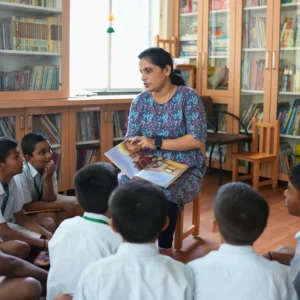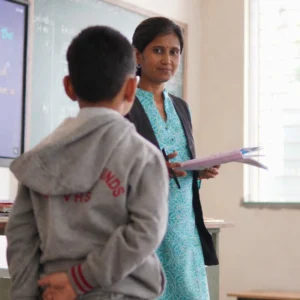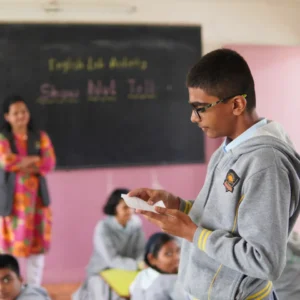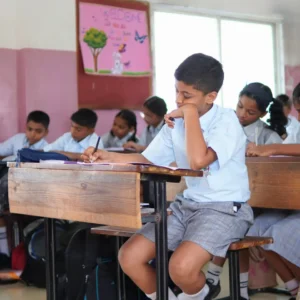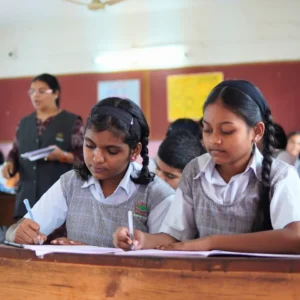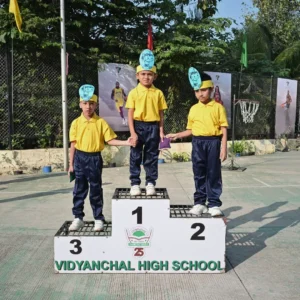In Indian households, education has long been viewed as a shared responsibility—one where schools provide structure, and families provide support. But in today’s world of fast-paced academic expectations and digital distractions, this division is no longer enough. Instead, the most successful students benefit from a synergistic partnership between parents and teachers, anchored by honest, ongoing communication.
At Vidyanchal High School (VHS), this triangle—student, parent, and teacher—is not just a framework but the foundation of how we nurture learning.
Why Communication Matters in 2025 and Beyond
As per an ASER (Annual Status of Education Report) 2023 study, parental involvement is the single most consistent predictor of student achievement across socio-economic backgrounds. The same study showed that schools with stronger parent-teacher interactions saw 25% higher academic progress rates over three years compared to those without such collaboration.
In a world reshaped by hybrid learning models and rising mental health concerns among children, communication can no longer be limited to PTMs or report cards. It must be continuous, intentional, and two-way.
The VHS Model: Communication as a Pedagogical Tool
Vidyanchal High School doesn’t treat parent-teacher communication as a formality—it is a part of the teaching process itself. Here’s how:
1. Regular and Purpose-Driven Updates
Teachers at VHS proactively reach out to parents, not just when there’s an issue, but to share progress, celebrate small wins, and seek feedback. This includes structured formats such as:
- Weekly student portfolios in primary classes
- Mid-term feedback loops beyond traditional report cards
- Event-based communication—like the Mallakhamb competition held recently, where parents were invited to see learning in action
(Ref: https://vidyanchalschool.com/a-sport-steeped-in-history-and-agility)
2. Parent Orientation and Involvement
New parents undergo a thorough onboarding process, where they are introduced to the teaching philosophy, activity-based learning, and expectations from both ends. Through workshops, parenting sessions, and open-house formats, a mutual language of trust is built.
3. Transparent Digital Tools
At VHS, digital platforms are used to share classwork, homework, photos, and behavioral notes in real time, which gives parents visibility into their child’s school life without micromanaging it. But the school is careful not to overload parents—updates are curated, thoughtful, and relevant.
How This Communication Impacts Students
1. Boosted Confidence and Academic Performance
According to a study by the National Institute of Educational Planning and Administration (NIEPA), students with engaged parents show a 30% higher performance rate in core subjects like math and science. At VHS, regular communication helps identify gaps early, co-create action plans, and motivate students through collective encouragement.
2. Lower Stress, Better Mental Health
In a survey conducted by the Centre for Social and Emotional Learning in India, 56% of middle-school students said that knowing their parents and teachers “talk regularly” reduces school anxiety. VHS reinforces this connection, especially during transitional phases like board classes or new grade levels.
Building Trust: What Parents Say
Mrs. Arora, parent of a Grade 6 student, shares:
“It’s not just that the teachers know my child well—they make sure I do too. When there’s a struggle, we talk about solutions. When there’s success, we celebrate it together. That’s rare.”
Such testimonials are echoed often, and supported by the fact that VHS maintains a 90%+ parent satisfaction score on annual feedback surveys.
Challenges and How VHS Addresses Them
Of course, meaningful communication isn’t without hurdles. Parents may be working full time; teachers are handling large classrooms. But Vidyanchal tackles these through:
- Scheduled time slots that respect work schedules
- Flexible formats—calls, notes, short digital updates
- Training teachers on empathetic and constructive communication
What sets VHS apart is the intentionality behind every conversation—it’s never about blame, but always about building together.
Why It’s More Important Than Ever
As education shifts from content mastery to future readiness, the role of parents must shift too. They’re no longer passive observers but co-educators. The National Education Policy (NEP) 2020 echoes this by emphasizing “community participation” and “parental engagement” as vital to school transformation.
With unpredictable job markets, climate change, and AI disrupting traditional career paths, the future cannot be prepared for alone. It takes a team, and that team starts at school—with teachers and parents in sync.
Looking Ahead: Communication as Culture
VHS believes that building 21st-century learners requires building a 21st-century learning culture, where feedback is frequent, voices are heard, and accountability is shared.
We’ve seen how:
- Small victories celebrated via teacher-parent notes lead to long-term motivation (see our blog on Celebrating Small Wins)
- Community-focused activities like exhibitions and sports days draw record parental participation each year
- Regular interaction leads to fewer behavioral interventions and higher attendance
The model works not because it’s tech-enabled, but because it is relationship-enabled.
Conclusion: A Shared Journey
In a culture where academic success is often treated as an individual pursuit, Vidyanchal High School invites parents and teachers to walk the road together. Whether it’s through open feedback channels, shared goal-setting, or just a phone call to say “Well done,” every touchpoint matters.
Because when students see their two worlds—school and home—speaking the same language, learning doesn’t stop at the classroom door. It becomes a shared journey, and every learner becomes stronger because of it.
Sources & References:
- ASER Report 2023 – asercentre.org
- NEP 2020 Full Text – education.gov.in
- NIEPA Learning Outcomes Study – niepa.ac.in
- Vidyanchal Blog on Celebrating Wins – https://vidyanchalschool.com/why-celebrating-small-wins-builds-lifelong-learners/


